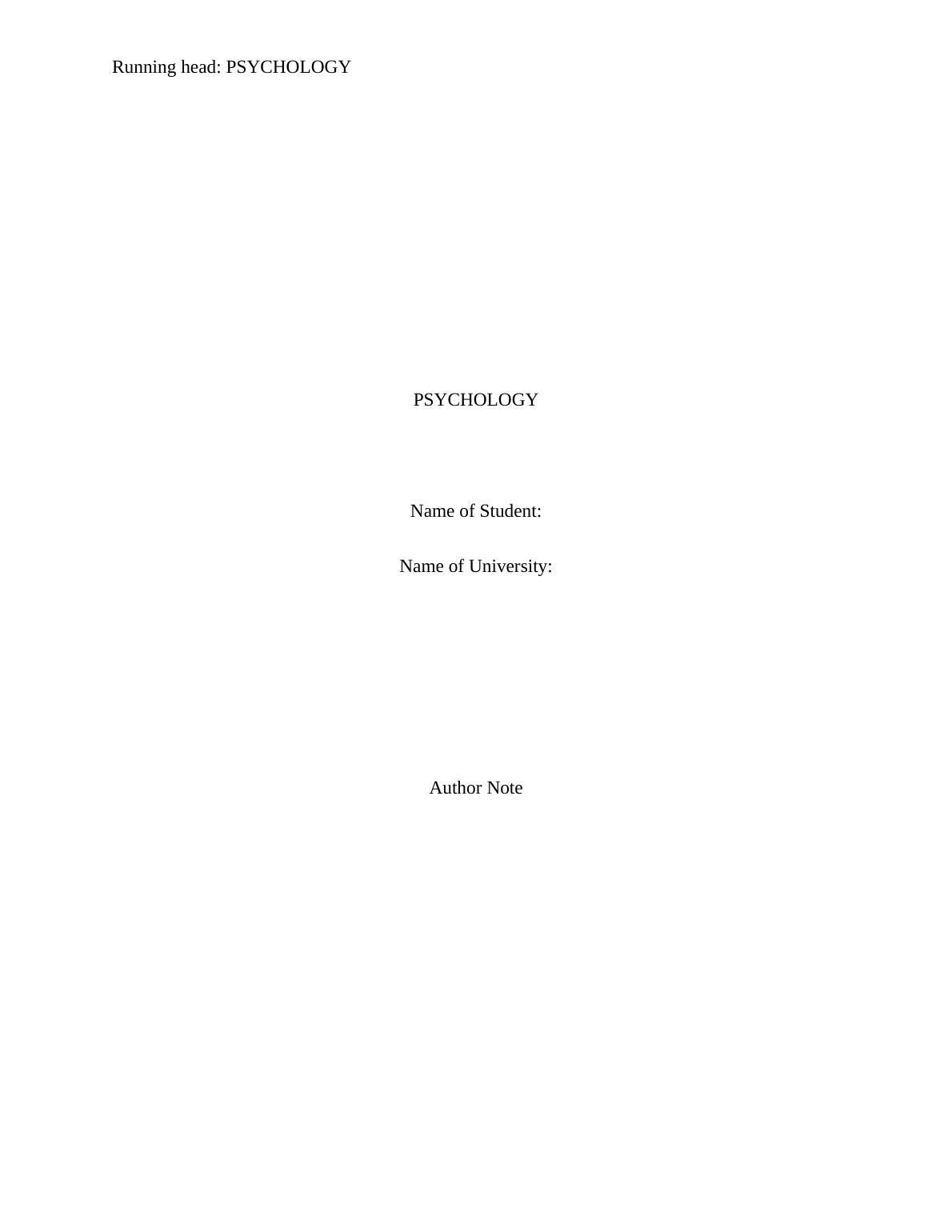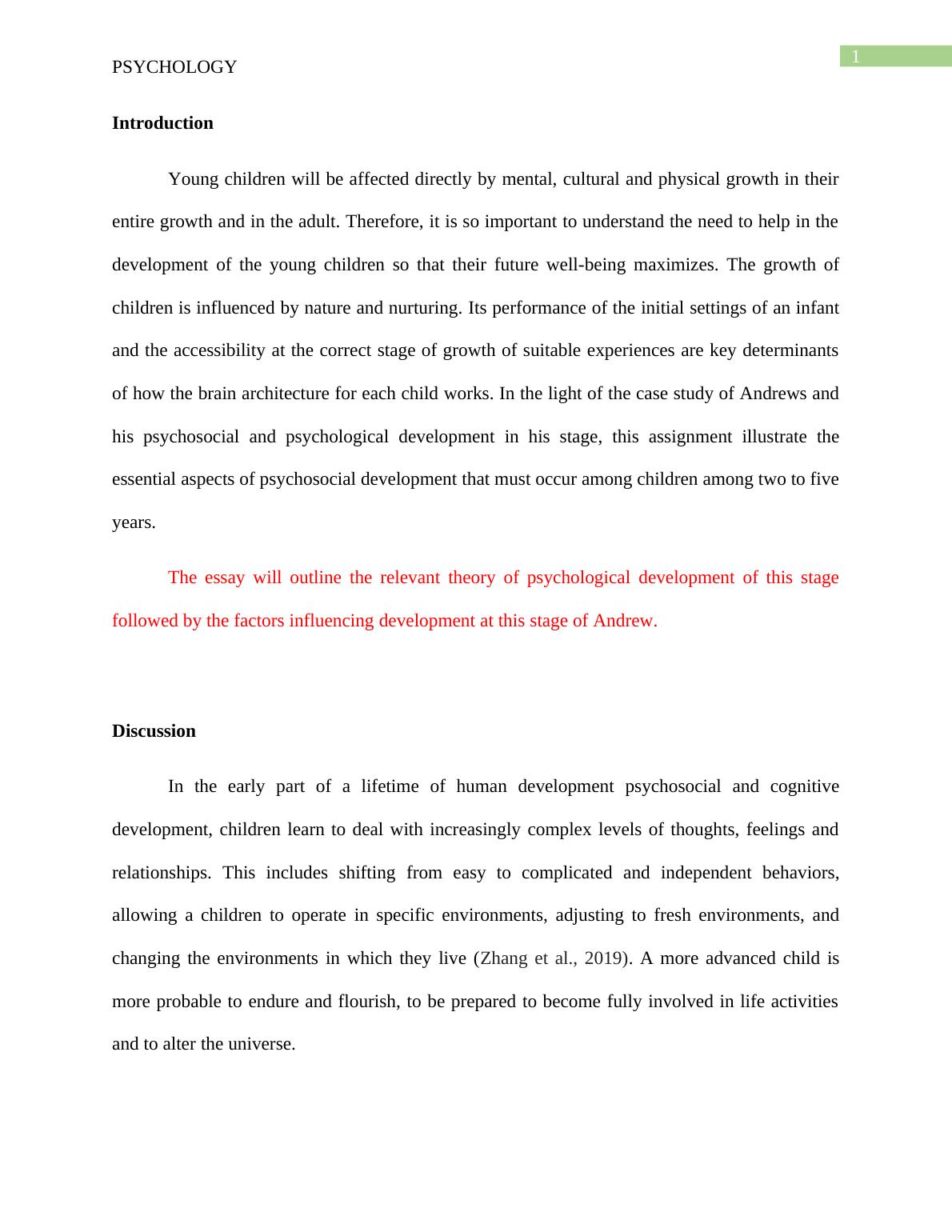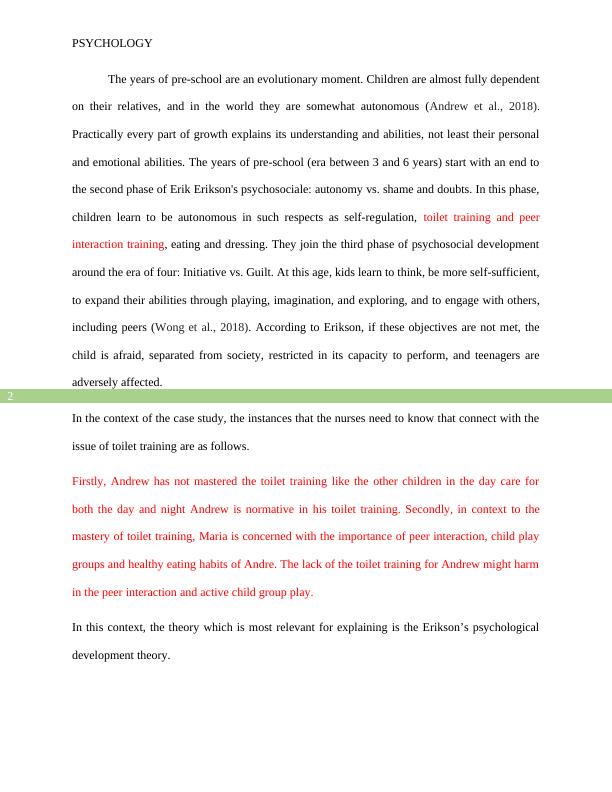Psychological and Psychosocial Development of Children: A Case Study of Andrew
Added on 2022-11-01
8 Pages2004 Words293 Views
Running head: PSYCHOLOGY
PSYCHOLOGY
Name of Student:
Name of University:
Author Note
PSYCHOLOGY
Name of Student:
Name of University:
Author Note

1
PSYCHOLOGY
Introduction
Young children will be affected directly by mental, cultural and physical growth in their
entire growth and in the adult. Therefore, it is so important to understand the need to help in the
development of the young children so that their future well-being maximizes. The growth of
children is influenced by nature and nurturing. Its performance of the initial settings of an infant
and the accessibility at the correct stage of growth of suitable experiences are key determinants
of how the brain architecture for each child works. In the light of the case study of Andrews and
his psychosocial and psychological development in his stage, this assignment illustrate the
essential aspects of psychosocial development that must occur among children among two to five
years.
The essay will outline the relevant theory of psychological development of this stage
followed by the factors influencing development at this stage of Andrew.
Discussion
In the early part of a lifetime of human development psychosocial and cognitive
development, children learn to deal with increasingly complex levels of thoughts, feelings and
relationships. This includes shifting from easy to complicated and independent behaviors,
allowing a children to operate in specific environments, adjusting to fresh environments, and
changing the environments in which they live (Zhang et al., 2019). A more advanced child is
more probable to endure and flourish, to be prepared to become fully involved in life activities
and to alter the universe.
PSYCHOLOGY
Introduction
Young children will be affected directly by mental, cultural and physical growth in their
entire growth and in the adult. Therefore, it is so important to understand the need to help in the
development of the young children so that their future well-being maximizes. The growth of
children is influenced by nature and nurturing. Its performance of the initial settings of an infant
and the accessibility at the correct stage of growth of suitable experiences are key determinants
of how the brain architecture for each child works. In the light of the case study of Andrews and
his psychosocial and psychological development in his stage, this assignment illustrate the
essential aspects of psychosocial development that must occur among children among two to five
years.
The essay will outline the relevant theory of psychological development of this stage
followed by the factors influencing development at this stage of Andrew.
Discussion
In the early part of a lifetime of human development psychosocial and cognitive
development, children learn to deal with increasingly complex levels of thoughts, feelings and
relationships. This includes shifting from easy to complicated and independent behaviors,
allowing a children to operate in specific environments, adjusting to fresh environments, and
changing the environments in which they live (Zhang et al., 2019). A more advanced child is
more probable to endure and flourish, to be prepared to become fully involved in life activities
and to alter the universe.

2
PSYCHOLOGY
The years of pre-school are an evolutionary moment. Children are almost fully dependent
on their relatives, and in the world they are somewhat autonomous (Andrew et al., 2018).
Practically every part of growth explains its understanding and abilities, not least their personal
and emotional abilities. The years of pre-school (era between 3 and 6 years) start with an end to
the second phase of Erik Erikson's psychosociale: autonomy vs. shame and doubts. In this phase,
children learn to be autonomous in such respects as self-regulation, toilet training and peer
interaction training, eating and dressing. They join the third phase of psychosocial development
around the era of four: Initiative vs. Guilt. At this age, kids learn to think, be more self-sufficient,
to expand their abilities through playing, imagination, and exploring, and to engage with others,
including peers (Wong et al., 2018). According to Erikson, if these objectives are not met, the
child is afraid, separated from society, restricted in its capacity to perform, and teenagers are
adversely affected.
In the context of the case study, the instances that the nurses need to know that connect with the
issue of toilet training are as follows.
Firstly, Andrew has not mastered the toilet training like the other children in the day care for
both the day and night Andrew is normative in his toilet training. Secondly, in context to the
mastery of toilet training, Maria is concerned with the importance of peer interaction, child play
groups and healthy eating habits of Andre. The lack of the toilet training for Andrew might harm
in the peer interaction and active child group play.
In this context, the theory which is most relevant for explaining is the Erikson’s psychological
development theory.
PSYCHOLOGY
The years of pre-school are an evolutionary moment. Children are almost fully dependent
on their relatives, and in the world they are somewhat autonomous (Andrew et al., 2018).
Practically every part of growth explains its understanding and abilities, not least their personal
and emotional abilities. The years of pre-school (era between 3 and 6 years) start with an end to
the second phase of Erik Erikson's psychosociale: autonomy vs. shame and doubts. In this phase,
children learn to be autonomous in such respects as self-regulation, toilet training and peer
interaction training, eating and dressing. They join the third phase of psychosocial development
around the era of four: Initiative vs. Guilt. At this age, kids learn to think, be more self-sufficient,
to expand their abilities through playing, imagination, and exploring, and to engage with others,
including peers (Wong et al., 2018). According to Erikson, if these objectives are not met, the
child is afraid, separated from society, restricted in its capacity to perform, and teenagers are
adversely affected.
In the context of the case study, the instances that the nurses need to know that connect with the
issue of toilet training are as follows.
Firstly, Andrew has not mastered the toilet training like the other children in the day care for
both the day and night Andrew is normative in his toilet training. Secondly, in context to the
mastery of toilet training, Maria is concerned with the importance of peer interaction, child play
groups and healthy eating habits of Andre. The lack of the toilet training for Andrew might harm
in the peer interaction and active child group play.
In this context, the theory which is most relevant for explaining is the Erikson’s psychological
development theory.

End of preview
Want to access all the pages? Upload your documents or become a member.
Related Documents
Development of psychosocial skills in childrenlg...
|6
|1727
|80
Psychological Development of a Child Assignment 2022lg...
|8
|2019
|19
Freud’s Psychosexual Stages and Erikson’s Psychosocial Stageslg...
|4
|562
|219
Psychosocial Developmentlg...
|7
|1873
|476
Psychosocial Development of Toddlers: A Case Study of Andrewlg...
|9
|2298
|192
Human Relationships and Life Transitionslg...
|6
|1743
|49